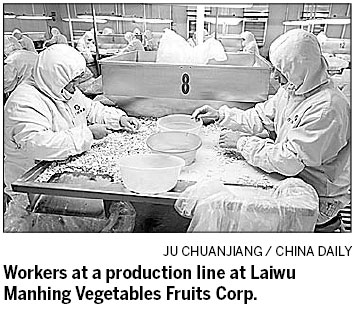

Liu Zhengming's newly built farmhouse is equipped with all the electrical appliances and mod-cons you would find in a city household.
"As you can see, life is much better now," says the 59-year-old ginger grower with a beaming smile.

That is because the farmer from Gongjiazhuang village, near Laiwu in Shandong province, transferred the rights to his land to China's largest exporter of ginger, the Laiwu Manhing Vegetables Fruits Corp, in 2008.
In China, farmland belongs to the State, but is allotted to farmers in small plots on long-term leases of usually 30 years.
Before the transfer, Liu had been struggling financially and had to borrow money to pay for his daughter's college tuition.
Growing ginger for Manhing, Liu now earns about 30,000 yuan ($4,950) a year plus 1,200 yuan rent from the transfer of the rights for his 2 mu (0.133 hectares) of land.
"It's a good deal. Before, I could make only about 4,000 yuan a year by growing corn and peanuts on my plot," he says.
Liu is one of 10,000 small farmers working together with Manhing in Laiwu municipality, China's major ginger and garlic production center, which helps protect them against the vagaries of the market and fluctuating prices.
Since 2004, Manhing has signed contracts with local village committees to acquire land-use rights for a total of 667 hectares in Gongjiazhuang and three other villages in the Laiwu city area.
The company employs the farmers to plant ginger. They earn a fixed salary plus payment for the transfer of land-use rights (600 yuan for the transfer of 667 square meters). The company also pays the village committees 100 yuan per mu as a management fee.
"We spend the money paying for road construction, tree-planting and other public welfare projects, which have solved a lot of problems and brought great changes to our village," says Shen Yulu, director of Gongjiazhuang village, which has leased 80 percent of farmland to Manhing.
The company has also signed contracts with farmers in Laiwu to produce ginger and garlic in an area of around 2,000 hectares. It offers them a reasonable price even when there is a sharp decline in market price.
"Farmers tend to team with us because our price is about 10 percent higher than the market price for those who have a cooperative relationship with us," says Liu Jianzeng, president of the company.
For the two types of partners, it provides the same seeding, fertilizers and technological training to ensure product quality and uniformity.
Established in 2001, Manhing has developed into a large export-oriented company specializing in production, processing, sales and storage of agricultural products.
The company, which was authorized as the exclusive ginger supplier of the 2008 Beijing Olympic Games, now exports 100,000 tons of garlic, 80,000 tons of ginger and related products and 100,000 tons of fruit to more than 80 countries and regions annually.
The first eight months of 2013 saw its export volume reach $86.9 million, accounting for more than 30 percent of Laiwu's total. It has been the country's leading ginger exporter for the past six years.
The central government encouraged farmers to transfer their land-use rights in 2008 to develop large-scale agriculture and raise the incomes of rural people, although Manhing had started acquiring them four years earlier.
"We had to do it," says Liu, who believes only large-scale and standardized farming can improve output and food safety levels. "Before, we mainly bought the agricultural products from farmers, but it is hard to control the quality and we could not always get a good price."
Using standardized farming, irrigation and natural fertilizers, the ginger grown on the 113 hectares of transferred land in Gongjiazhuang village now is sold to Japan and Europe. It has higher quality standards. For $1,200 per ton, it is three times the price they used to get from selling to countries in Southeast Asia and the Middle East, Liu says.
"If you want to get into the foreign high-end market, you have to meet quality standards," he says, adding that there are 309 items on the tests for pesticide residue that the ginger has to pass before entering the Japanese market.